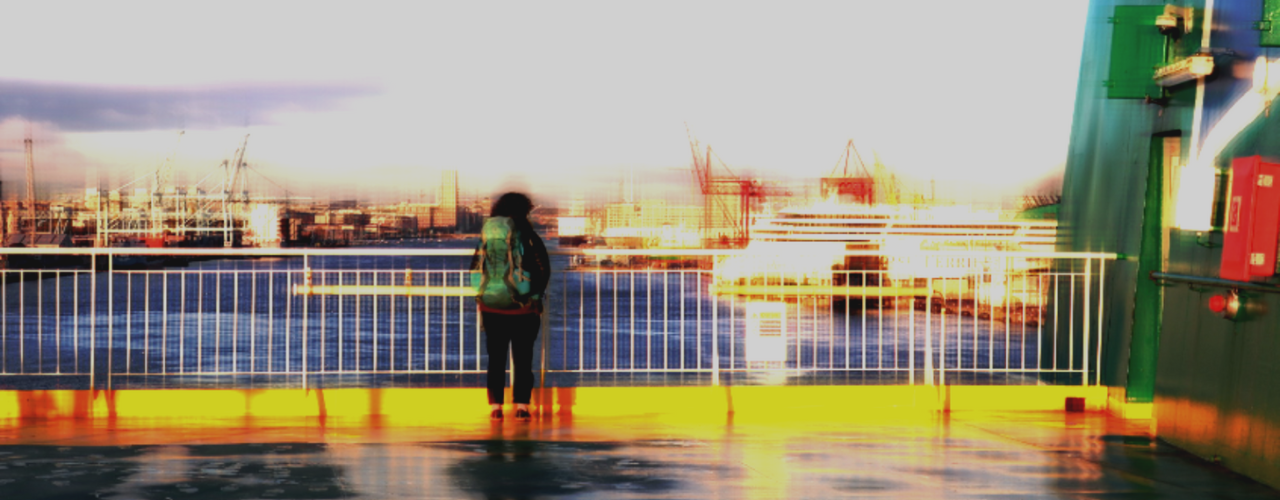
Working as the Environmental Policy Advocate in the Jesuit Centre for Faith and Justice means that I sometimes get the opportunity to travel across Europe to meet with other Jesuit partners and organisations. This role also means that I do as much as possible to reduce my carbon footprint when I travel.
Travelling slow is a strange paradox of privilege and concession. It is without question that travelling from Ireland to many places in Europe is slower via boat and train or bus than by aeroplane. There is the added element of increased time away from your desk and family responsibilities which can be a lot more problematic. Travelling slower also tends to be more expensive than travelling faster. This is ironic as flying uses considerably more resources than slower modes of transport. If looking solely at these criteria the decision seems obvious.
What we tend to consider less is the privilege of using these considerable resources to take – the sometimes necessary – faster modes of transport. Aviation accounts for approximately 2.5% of global emissions. But as emissions fall in other areas and the aviation industry continues to grow, this percentage will substantially increase.
The debate around curtailing air travel and opting for alternative means of transport and less travel is an active one in the climate action space. It is a difficult discussion as on one hand the emissions produced are consequentional. More flights means that more emissions will be produced. On the other hand, people travel for a myriad of different reasons and defining what is frivolous and what is necessary is an extremely tricky balance to find, but one that we all must grapple with. This blog is not an attempt to dictate what this balance may be, it is just an attempt to share my experiences in the hope that they may help others who are also finding their own balance.
To be clear, while I have made attempts to reduce my flying I have not been able to completely cut it out. The balance generally gets tipped when time is short. I started thinking about this blog when I was at a work event in Madrid. I arrived there via ferry and bus however, due to time constraints, I flew home.
Antidote to rapidification
In his encyclical Laudato Si’, Pope Francis laments the “more intensified pace of life and work” (LS18) which he terms “rapidification”. There is a tendency within us to continuously strive to be busy and productive however we rarely take the time to question why it is we put so much pressure on ourselves to constantly strive for more, bigger and therefore seemingly “better”, however “the goals of this rapid and constant change are not necessarily geared to the common good or to integral and sustainable human development.” (LS18) Rapidification is not only detrimental to our wellbeing but is also an essential cog in our commercialised world – as we increase our pace through life we burn through increasing amounts of energy and resources to meet our expectations.
While choosing to travel slower is not in itself the answer to all of these questions, it does in essence force us to slow down, even for a short time. The decision to spend more time on the journey counters the premise of rapidification. The time it buys for us as we make that journey also gives us time to reassess priorities – or just read a book.
Despite the benefits of travelling slower, the barriers remain, with time and expense at the top of the list. While everyone can make personal decisions about finding the balance in terms of sustainability and practicality, they should not feel guilt for not being one of the few who have the flexibility and funds to make this type of transport realistic.
Government and employers can shift the balance, enabling people who would like to take their time to do so. Additional paid or unpaid leave from work for holidays taken via a slow route is an initiative some companies have signed up for. Subsidised air travel, which results in artificially cheap fares, incentivises increased air travel over the relatively expensive rail and bus travel. Government and transport bodies have a huge role to play here. Directing investment to improve services and prices of public transport as well as collaborating with other European countries to streamline and reduce the expense of sail and rail are important initiatives. The newly announced Sail and Rail ticket between Ireland and France is such an example of the work that can be done in this area.
My role as Environmental Policy Advocate was the catalyst for me to reduce the carbon emissions I racked up when travelling for work or pleasure. For me, the balance was tipped by the responsibility of trying to live the message I was trying to spread. But it was only by actually taking the leap – onto a boat and not a plane – did I fully understand the benefits of transforming how we move. While I still struggle with that balance, I am hopeful that innovative solutions to make travelling slower a more accessible option will help to tip the balance even further away from rapidification towards a decarbonised, slower future.

